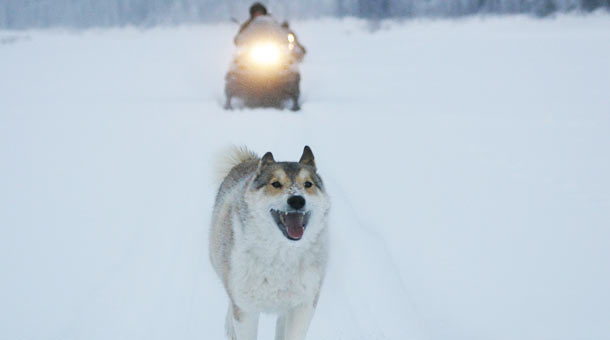
Herzog lends the golden touch that is his voice to the film, making the grueling, harsh winter landscape lyrical and poetic.

Herzog lends the golden touch that is his voice to the film, making the grueling, harsh winter landscape lyrical and poetic.
Werner Herzog chops up and rearranges footage from a Russian television documentary about Bakhtia, a remote Siberian village on the Yenisei river, and provides his signature lyrical narration that elevates the footage into a moving examination of strength, liberation, and friendship (of the man/dog variety.) It’s a film about a people with a deep love and respect for nature that can only be developed in an environment isolated from technology and modernity. These are not wealthy people monetarily, but they lead richer lives than most can imagine.
The majority of the film takes place in the snow-covered wilderness of Taiga, the region of Russia in which Bakhtia lies. The primary subject of the film is Gennady, a ‘trapper’ who hunts and traps animals in the vicious Siberian winter with his dogs, his most trusted companions. It’s an unbelievably laborious (and sometimes dangerous) job carried out under harsh conditions, but Gennady is as happy a man as you’ll find, as his connection with nature is what drives his spirit. His reverence for nature is represented in his respect, appreciation, and deep understanding of his dogs. In a stirring scene, he recounts an incident in which he risked his life against a bear to save the lives of his canine friends, to no avail. The sadness in his eyes as he remembers his lost pets is moving.
His familiarity with the land he walks is further demonstrated in a scene where he explains to the finest detail the best way to make skis from a tree. As he drives a wooden wedge (which he has expertly made himself) into a log, splitting it without compromising the grain of the wood, it’s apparent he’s done this countless times. What’s also apparent is that his work is his passion, as he details the age-old process of creating traps with a soft-spoken reverence. Gennady’s spirituality and happiness exist in the snow, trees, animals, and biting cold that blanket him.

Happy People: A Year in the Taiga does spend time with other villagers, the most memorable of which is a man who explains the dark side of the isolation the villagers experience; many are afflicted with alcoholism and depression, a problem that has plagued his community for years. The film spends too little time with him, perhaps in service of the title and general message of the movie. We also see a man who is one of the last experts at building canoes from one piece of wood. To watch the incomparable resourcefulness of these people is inspirational.
The footage the Russian TV crew has captured is standard nature-documentary fare, though that is by no means a bad thing. The shots of the massive expanse of the Taiga and the Yenisei are breathtaking, but it’s the quiet moments with the people of Bakhtia that are most beautiful. To witness the majesty of the Taiga is crucial to understanding the happiness of these people, and the film crew does a fine job of communicating that beauty. The film sounds as good as it looks; to hear the loud crunch of the thick Siberian snow shifting underneath Gennady’s feet makes the experience all the more engaging and immersive.
Herzog lends the golden touch that is his voice to the film, making the grueling, harsh winter landscape lyrical and poetic. There are certain segments where Herzog perhaps goes too far in his celebratory representation of the people. In one scene, Herzog poetically explains the beauty of the liberation that trappers feel in their self-reliant life in the wilderness. His narration is full of flourishes and is not necessary to get across the message of the movie, but it doesn’t greatly hurt the film either. Happy People is an almost-great film that is a worthy entry into Herzog’s oeuvre.